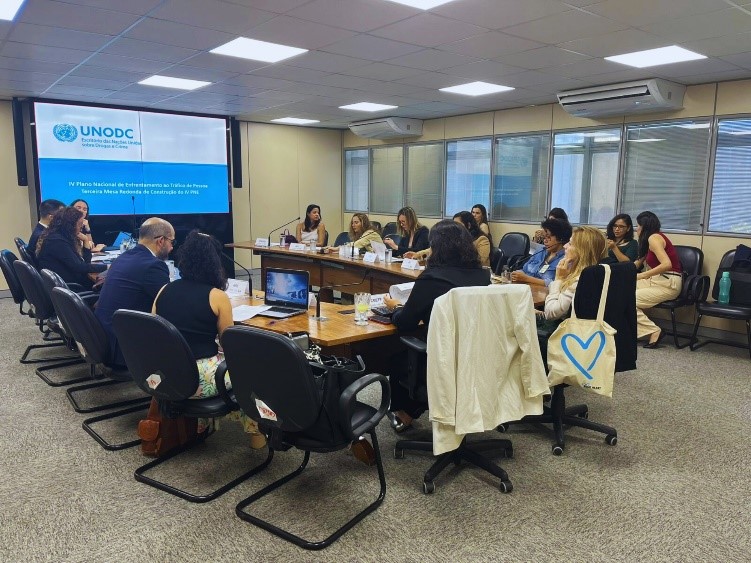UNODC Brazil promotes training on human trafficking for social workers and health agents in Amazonas
Manaus (AM), April 26, 2024 – In partnership with the Ministry of Justice and Public Security (MJSP), the United Nations Office on Drugs and Crime (UNODC) in Brazil carried out, through the Track4TiP project, training on human trafficking for workers in the social assistance network (SUAS) and health network (SUS) of Amazonas, at a training event in Manaus, between the 25th and 26th of April.
With the presence of the General Coordination for Combating Trafficking in Persons and Smuggling of Migrants (CGETP) of the Ministry of Justice and Public Security (MJSP), the trainings addressed topics such as national and state policies to combat trafficking in persons; identification and humanized care for victims; specificities of migrant and indigenous populations; migrant smuggling on Brazil's Northern Border, among others.
More than 60 professionals from the state network of social assistance and health of Amazonas participated in the training, with representatives coming from municipalities such as Tabatinga, São Gabriel da Cachoeira and Tefé. Organized by UNODC, the event also had the support of the Regional Council of Social Service (CRESS) and the University of the State of Amazonas (UEA), which provided the space and carried out a live broadcast of the training, with simultaneous translation into Brazilian Sign Language (Libras). Due to the live broadcast, the event reached participants from other regions of Amazonas and neighbouring states, such as Pará and Amapá.
The first day of the event's program featured presentations by UNODC Brazil and the Ministry of Justice and Public Security (MJSP), which detailed the National Policy to Combat Trafficking in Persons (PNETP). The state policy was presented by the State Secretariat of Justice, Human Rights and Citizenship of Amazonas (SEJUSC/AM). The International Organization for Migration (IOM), a supporter of the training, gave a presentation on migration and migrant smuggling at the borders of the Northern region.
On the second day, the program consisted of round tables and group activities on assistance to the indigenous population in social assistance and specific demands for services by the migrant population – ending with the elaboration of an action plan for the state network on the theme of human trafficking and assistance to victims.
The event was also attended by representatives of the United Nations Children's Fund (UNICEF), the UN Refugee Agency (UNHCR), the Court of Justice of Amazonas (TJ-AM), Caritas Brazil, the Santo Antônio Institute for Child and Adolescent Assistance (IACAS) and the Federal University of Amazonas (UFAM).
Track4TiP – TRACK4TIP is an initiative implemented by UNODC, with the support of the Office to Monitor and Combat Trafficking in Persons (JTIP) of the United States Department of State. The project, which began in 2019, benefits eight countries in South America and the Caribbean – Ecuador, Peru, Brazil, Colombia, Dominican Republic, Trinidad and Tobago, Curaçao and Aruba – with national and regional actions.
The overall objective of Track4TiP is to enhance the regional criminal justice response to trafficking in persons in the migration flows of beneficiary countries, through a multidisciplinary and victim-centred approach, and actions at the regional and national level to identify, prevent and prosecute cases.
***
This press release was made possible by the support of the U.S. Department of State under Agreement No. SSJTIP19CA0027. The views presented herein are those of the author(s) and do not necessarily reflect the views of the U.S. Department of State.
